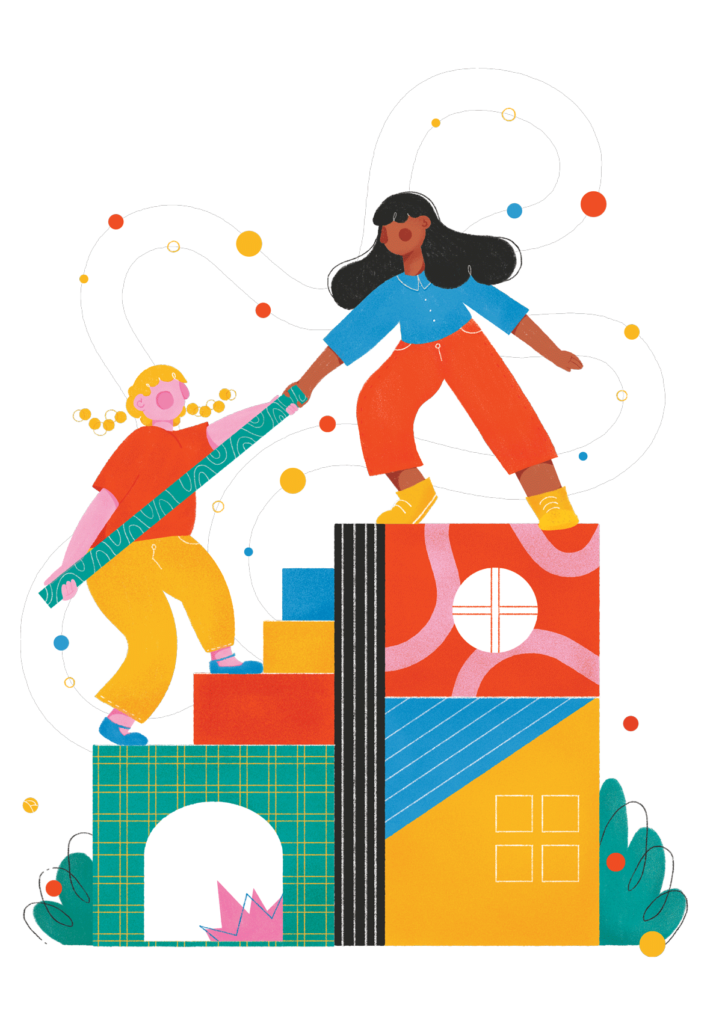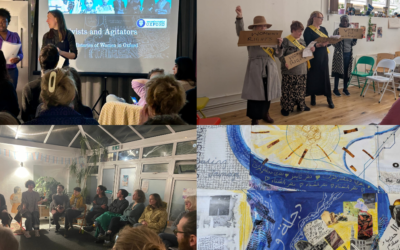Project Spotlight: Makespace Oxford
Andy Edwards in conversation with Georgina Bowman
illustration by Anamaria Sabino
Makespace Oxford is a non-profit community organisation with the aim of unlocking vacant or underused spaces that are revitalised for use on a “meanwhile” basis. Set up in 2015 as a CIC, Makespace is the result of years of collaboration with local community actors, having observed that:
1. Many groups were completely unable to access affordable secure space, or at best finding themselves in precarious short-term leases, while:
2. The number of empty buildings along the high street was rapidly increasing.
In response to this situation, Makespace has been strategising a win-win solution for both owner and tenant, offering the revitalisation of spaces in return for affordable, if only temporary, leases, and ultimately working to restructure models for community-led practices and ownership.
How does Makespace respond to – and set out to alter – the real estate context of Oxfordshire?
We’re trying to access space using ‘meanwhile’ leases, which we situate on a continuum between pop-ups and multi-month use, but it could be longer – so far, we’ve secured longer leases from 12 months to ten years. There are some very real limitations to meanwhile use, but we’re interested in how it can be used as a catalyst to effect change longer-term. Meanwhile access to a space can mean the difference of make or break to an organisation that’s starting up, to give them time to consolidate and secure funding or revenue streams that allow them to take on their own space longer-term. It can also open the door to potential acquisition of space for community ownership, one way in which meanwhile has a real potential for systemic change. But we’re working in a heavily financialised, commodified system. A lot of work needs to be done to enlighten landlords and demonstrate that there can be benefit in more social and environmental uses being undertaken in and amongst that very extractive model. We’ve found that local authority landlords have a huge amount of empty and underused space, following a decade of austerity and considerable defunding of some core pieces of infrastructure. Sadly, many public assets have been sold off during this time, while more still remain in public ownership but are empty or underutilised. There’s an opportunity here to align strategic interests around delivering a social impact.
Makespace Oxford is not just an idea or a project, it’s a demand to our city and the wider county – to those who own the land and hold the power – to make space for the organisations and groups tackling some of the biggest social and environmental challenges of our time. These are the organisations that we need to thrive. They will not only help us rebuild our local economies, but they will also help us revive our high streets and strengthen our communities.
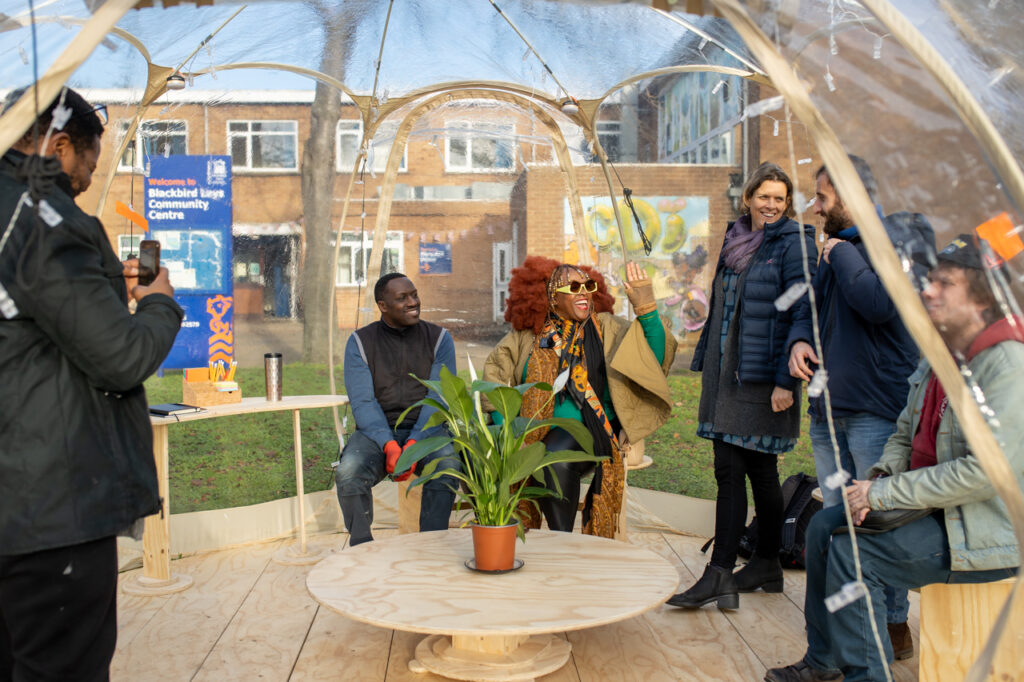
Owned by Oxford Community Wealth Building Dome at Blackbird Leys Community Centre
How do you position MakeSpace’s role between landlords, tenants and the council?
You have to take different landlords with very different strategic approaches. The instinct with local authorities is that meanwhile makes sense, particularly if the organisations taking over those spaces are delivering some kind of social benefit, perhaps alleviating certain pressures on some essential, and heavily oversubscribed, social services. We’re very fortunate that Oxford City Council subscribes to the idea of generating a more inclusive economy, and they’re starting to decouple that narrative from growth, which is fantastic. But that is very hard to enact where you’ve got an under-funded council.
In Oxford there are also a lot of colleges that make up the university which operate with an orientation that isn’t necessarily motivated by profit or short term extraction of rents. But at the same time, they do own property and they do own assets. You have to think how there could be a win-win between the social benefit you’re creating locally and the benefit you might be generating for their students. Or it might be that you can simply save them money and that’s where a college property owner and private property owner’s interests perhaps align. So meanwhile use provides a model where you can alleviate the costs and hassle. It’s the job of meanwhile use to demonstrate what we call prefigurative intervention – showing what’s possible, making it feel inviting, and something that landlords, tenants, or the local authority actually want to be a part of. The entry point is meanwhile, but it has to be a catalyst; it’s not an end in itself. It doesn’t affect systemic change if it doesn’t then lead to a shift in what longer term placemaking looks like and who actually owns the land underneath.
Makespace seems to occupy a position which is landlord-adjacent, but with a purpose-led ethos and good building maintenance. Is it fair to say Makespace is a new type of social landlord?
Alastair Parvin from Open Systems Lab has some really interesting thoughts on this, really zoning in on how antiquated and extractive the term ‘landlord’ is. We and others in our community are trying to think much more about ‘stewardship’ and what that might look like. I’m really interested in the question, on a more philosophical level, of what it means to be a good ancestor in this space. What are we passing onto the next generation? Even though our tools and our tactics are around meanwhile use, we need to think in a longer-term cycle. If you can put the right steps in place and build power in the right places, what are its effects in seven generations time, rather than just thinking about the next financial cycle? One of our big strategic objectives is around narrative change and shifting the language.
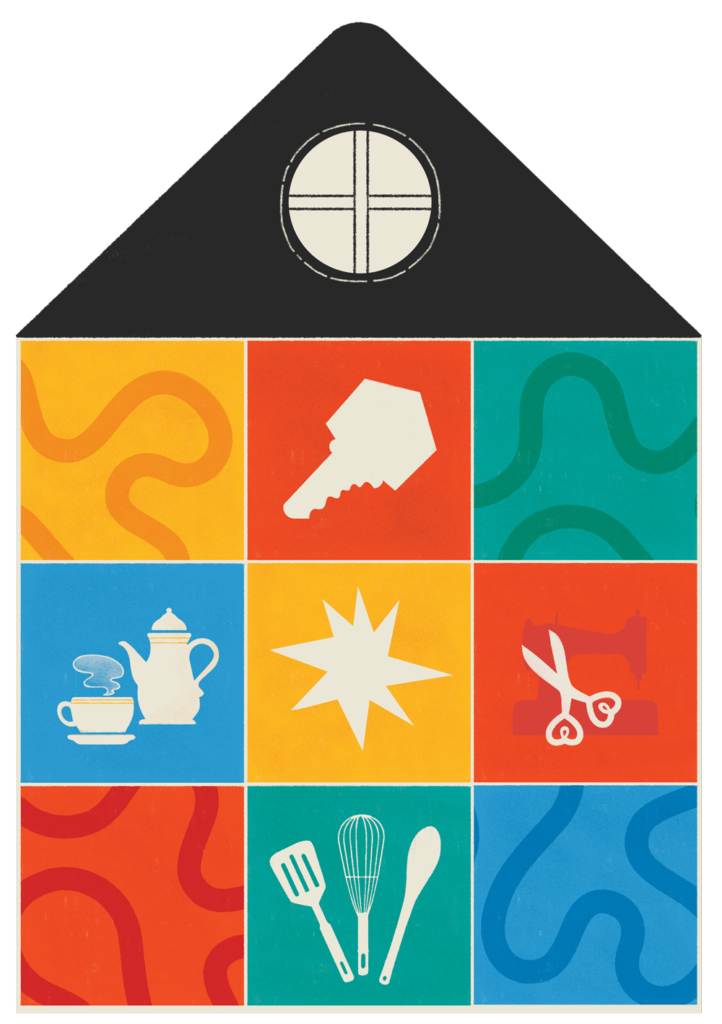
Illustration by Anamaria Sabino
With respect to the famous architectural proverb, “The greenest building is the one that already exists,” your approach definitely seems to practise a sustainable method for “making space”. Do you think that the business model of Makespace will be sustained in the future?
In Rebranding Precarity (2020), Ella Harris discusses how, at worst, meanwhile use can be an agent for a kind of hyperspeed gentrification and an apologist for the systemic failings that are going on. There’s an argument that we’re just rebranding precarity and making it look shiny and alluring. But actually everyone’s desperately trying to struggle and survive on very small margins. Unless we can find a way to gain some security and resilience for ourselves longer-term, we are not able to shift the dial. Some acquisition of assets freehold is critical, and is part of our longer term plan. We want to see land and buildings placed in trust so that we can guarantee the benefits are retained locally and the work is accountable to local communities. We’re developing a vision for a hub-and-spoke model – where we first leverage the speed and energy of meanwhile but where at least part of our constellation of buildings will be there in the long-term. There’s much inspiration to draw here from the Community Land Trust movement and new models like, Fairhold and the Ecological Land Co-op.
Makespace has grown very quickly in the last 18 months – we’ve gone from two hub spaces to unlocking almost 30 buildings. Now we have to build some deeper relationships and work with communities to respond to their needs more directly. I think there’s the opportunity to say we don’t need to be the ones intervening. We’ve got no interest in becoming a monopoly operator for the region, let alone further afield. Instead, we’re thinking about how we can be better networked and operate within an ecosystem where we have a few demonstrator hubs that are prototyping and testing new models: innovating with design approaches, finance, governance, legal models, and ways of building community. The exciting next step for us is to start sharing open-source toolkits and the learnings that we’ve gathered so that communities can do it for themselves.
Building on that, do you have people on your team who do the practical work of carpentry, electrics and plumbing? And would it be feasible to bring in members of the community to learn some of these practical skills and approaches to securing a meanwhile space?
Self-build and co-build elements were very much in the spirit of the original hub space we set up in North Oxford in 2018. The original conception of Makespace was not just space for people sitting on laptops, but also for those making, repairing, and building, because that was the main need declared by the founding organisations. We had a bicycle repair workshop, tailors, architects, carpenters, and a whole range of artists and creatives. We were thinking about how we could actually unlock messy space and allow for that space to be co-produced, which is such an important part of building a sense of ownership and belonging in a space.
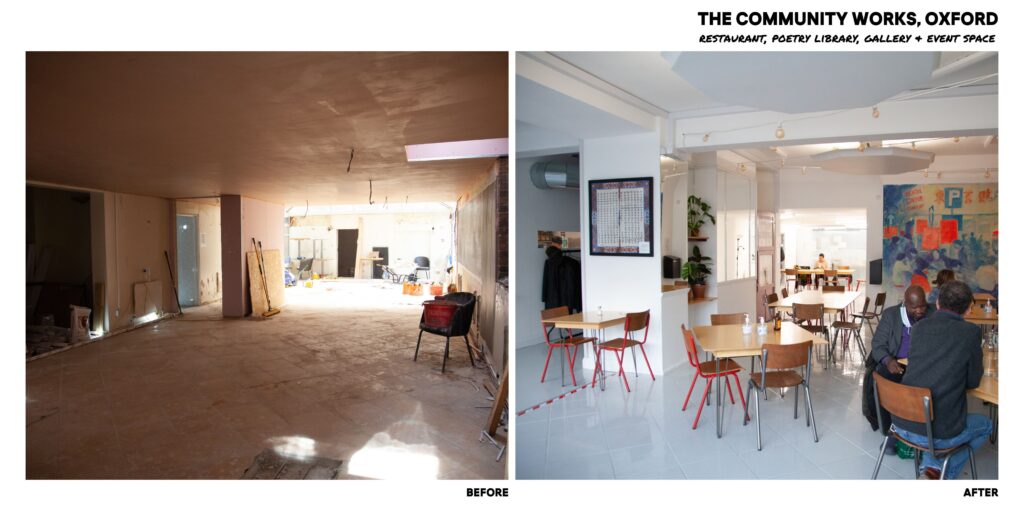
The Community Works, a community hub in the heart of Oxford
Finally, what does ‘community ownership’ mean to Makespace?
In a strategic sense, community ownership has been really well defined, with one of the best examples being community land trusts. But you can talk about community in many different ways, based on geography, interests, or identity. We see the building of our community as trying to bring all of these things together. Community ownership for us is underpinned by co-creation and collaboration, working to support others through mutual aid, and solidarity, and recognises that there’s both a necessity and an inherent benefit in organising around shared struggle. For us, it’s about having representation on the boards from our residents and our local communities who use the spaces and who have a say in the strategic direction of the organisation. Over the last year or so we’ve begun to invest heavily in Sociocracy to embed democratic decision-making and autonomy in how we work. We still have leadership and dynamic hierarchies, but it’s very much in the spirit of subsidiarity, devolving power and decision making to the level where people are most affected. Whether it’s in community building, workspaces, communications, or operations, the teams are able to operate fairly autonomously and then collaborate to solve problems together.
While we started as a CIC to stay more agile and fleet of foot, we are returning to the idea of membership and co-operative structures as we become more established. We’re always looking to democratic mechanisms for the way our organisation and our community functions. We see this as part of how we shift from individualised and extractive models of ownership towards ones that are more democratic, plural and more equitable. ∞
